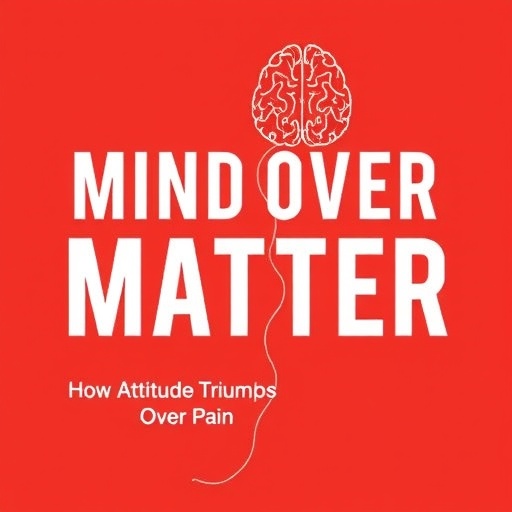In a groundbreaking study published recently in PLOS One, researchers at the University of Portsmouth have illuminated a critical psychological factor influencing physical activity among individuals suffering from chronic pain: pain resilience. This study challenges long-held assumptions that pain intensity alone is the primary determinant of activity levels in those enduring chronic discomfort. Instead, it reveals that an individual’s ability to withstand and manage pain—referred to as pain resilience—is paramount in maintaining physical activity, a crucial component for overall health and well-being.
The research team, led by Dr. Nils Niederstrasser from the School of Psychology, Sport and Health Sciences at the University of Portsmouth, conducted an in-depth statistical analysis on data collected from 172 persons living with chronic pain. These individuals were evaluated on various factors including pain intensity, duration, the extent of painful area coverage, fear of movement (kinesiophobia), and frailty. Contrary to traditional focus areas, the findings emphasized that pain resilience, more than any other examined variable, had the strongest association with higher levels of physical activity.
Pain resilience can be understood as the psychological capacity to persevere despite ongoing pain, enabling individuals to maintain function and engagement in physical activities despite their discomfort. The researchers discovered that this resilience factor independently predicted activity levels, even after controlling for the severity and intensity of pain itself. This insight crucially differentiates between the physiological experience of pain and the behavioral and cognitive responses that shape how people cope.
Interestingly, the study debunks the common notion that fear of movement significantly restricts physical engagement in chronic pain sufferers. While kinesiophobia has been widely regarded as a barrier to activity, this investigation found it to have a negligible impact compared to pain resilience. This finding invites a paradigm shift in clinical approaches, focusing less on mitigating fear and more on fostering resilience-building interventions that enhance patients’ coping skills with pain.
The implications of this research are far-reaching, signaling a move toward incorporating psychological resilience training as a core component in chronic pain management protocols. Psychological interventions such as cognitive-behavioral therapy (CBT), acceptance and commitment therapy (ACT), and resilience-focused counseling could play an instrumental role in boosting patients’ ability to sustain physical activity despite their pain levels.
Moreover, given that physical activity itself is a pivotal element in preventing and managing chronic pain, the study’s conclusions create a positive feedback loop for clinical practice. Enhancing resilience could not only improve pain management outcomes but also promote greater physical activity, which in turn may reduce pain severity and improve quality of life through improved physical fitness, reduced inflammation, and enhanced mental health.
Dr. Niederstrasser emphasizes the importance of reframing how healthcare providers and patients perceive pain, suggesting that “how individuals think about and respond to pain matters more than the actual pain sensitivity.” This psychological reappraisal underscores a complex biopsychosocial model of pain, where cognitive and emotional processing influence physiological outcomes, emphasizing resilience as a modifiable and empowering factor.
This novel research builds upon Dr. Niederstrasser’s earlier work demonstrating that higher levels of physical activity can lower the risk of developing chronic pain. The prior findings advocated for integrative prevention strategies that include exercise, weight management, and addressing social determinants of health. The current study deepens this narrative by identifying resilience as a key target for intervention to maintain and enhance these beneficial activity levels in individuals already affected by chronic pain.
The study’s robust methodology employed sophisticated statistical modeling to parse out the intricate relationships between pain resilience, kinesiophobia, pain intensity, and physical activity. These models provided clarity on indirect associations, reinforcing the conclusion that psychological resilience acts as a protective factor and buffer against the physical limitations imposed by chronic pain.
Ongoing and future research endeavors are expected to explore interventions designed explicitly to enhance pain resilience. These may include resilience training programs, mindfulness-based stress reduction, and personalized exercise regimes integrated with psychological support. Such targeted approaches aim to empower individuals to overcome the debilitating effects of chronic pain and foster sustainable engagement in physical activity.
The significance of this research lies not only in its scientific merit but also in its potential to transform clinical practices and patient outcomes. Traditionally, pain management has concentrated heavily on pharmacological solutions or attempts to reduce pain intensity. This study advocates a dual approach—reducing pain but, critically, strengthening resilience—to improve functioning and quality of life for chronic pain sufferers.
In conclusion, this pioneering study from the University of Portsmouth marks a pivotal advancement in our understanding of chronic pain management. By shifting the focus toward enhancing psychological resilience, healthcare professionals can better support patients in leading active, healthier lives irrespective of their pain levels. This work heralds a future where resilience-building is not ancillary but central to chronic pain treatment paradigms.
Subject of Research: People
Article Title: Indirect associations of pain resilience and kinesiophobia with the relationship between physical activity and chronic pain
News Publication Date: 22-Oct-2025
Web References:
References:
- Niederstrasser, N. et al. (2025). Indirect associations of pain resilience and kinesiophobia with the relationship between physical activity and chronic pain. PLOS One. DOI: 10.1371/journal.pone.0334144
- Niederstrasser, N. et al. (2022). Physical activity and chronic pain risk: the role of exercise and social factors. PLOS One. DOI: 10.1371/journal.pone.0263356
Keywords: Physical exercise, chronic pain, pain resilience, kinesiophobia, psychological resilience, physical activity, chronic pain management




